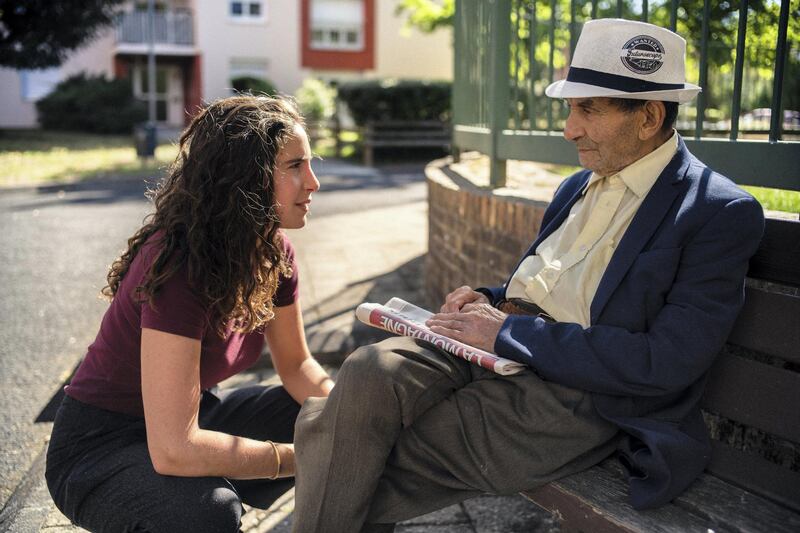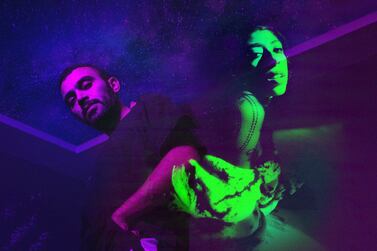The UK’s only Arab film festival is partnering with Shubbak, Europe’s largest festival of Arab culture, to deliver a hybrid programme of its screenings for the first time. Returning for its sixth year, Safar Film Festival features 20 films, including three UK premieres, and a host of talks and events.
Running in three London cinemas from Thursday, July 1, the festival will take place across 10 days with a free online programme of films.
Safar’s curator, Rabih El Khoury, said the festival was "raring to get back into cinemas" with its largest programme to date. Under the theme Generational Encounters in Arab Cinema, El Khoury’s selection of contemporary and classic films look at the regional evolution of youth and societal tensions stirred by the revolts of a decade ago.
“Ten years on, we invite you to join us in reflecting on the new Arab generation born from the Arab uprisings: one that stood up on its feet and faced power with their distinct hopes, flamboyant aspirations and the dreams of a better tomorrow," said El Khoury.
Safar opens with the UK premiere of Souad, a feature film by Egyptian director Ayten Amin that looks at the impact of social media on the youth in his native country, which received the Cannes 2020 label.
Other UK premieres include We Are From There, a documentary by Wissam Tanios following his Syrian cousins' journeys across the Mediterranean into Europe, and Lina Soualem's Their Algeria, which looks at the immigrant lives of an elderly couple who separate after six decades of marriage.
Founders of Safar, the Arab British Centre, said the new partnership with Shubbak created a stronger force for amplifying the voices of Arab artists and filmmakers after a difficult year for the cultural sector.
“As the world's eyes turn to Palestine and protests the world over bring generations young and old on to the streets in support of lasting change, we look forward to reflecting on this through our theme and through our conversations with filmmakers,” said Amani Hassan, programme director of the Arab British Centre.
Film director Ameen Nayfeh will close the festival with a discussion on Palestinian cinema following the screening of his film, 200 Meters. Also showing is Mohamed Malas's The Dream, filmed 40 years ago in the Palestinian refugee camps in Lebanon.
Here are five must-see films at this year’s festival:
1. 'Souad’ at the Barbican, Cinema 1
Thursday, July 1 at 6pm GMT
A film about the trials of adolescence, first love and the search for validation, Souad follows the life of a 19-year-old navigating the pressures of a conservative society and the freedom of expression found online.
The second feature from Egyptian director Ayten Amin was screened at last year's Cannes Film Festival, and in March at the Berlinale.
"I was always interested in how social media played a role in changing the relationships we have," Amin told The National.
“It plays a major role for girls in small cities in Egypt because it’s like a window of freedom. It’s a place where they can play certain roles away from their daily life, their conservative life. It’s a place where they have a daily boost.”
2. ‘We Are From Here' at the Barbican, Cinema 1
Tuesday, July 6 at 6pm GMT
Wissam Tanios’s first film began as a way to cope.
Upon hearing his Syrian cousins Jamil and Milad Khawam were leaving for Europe, he documented the days leading to their departure. The end result is a soulful film about the promise and heartache of the migrant experience.
Premiering at the International Film Festival Rotterdam in January 2020, We Are From There went on to win the Best Arab Film award at the 2020 Cairo International Film Festival.
"My survival mode was to take the camera and start filming," Tanios told The National.
“I understood that at the end of the film, not at the beginning. At first, when you’re filming, these ideas are not very clear to you.”
3. 'A Son' at Cine Lumiere
Saturday, July 3 at 8.35pm GMT
A country holiday turns into a nightmare for a Tunisian couple when their 10-year-old son is shot in an ambush. The resulting injuries changes the family's life and leads to a buried secret that could tear them apart.
Speaking to The National after the film's premiere at Venice Film Festival in 2019, director Mehdi Barsaoui said: "My film is an invitation to go beyond [biological parenthood] and see the loving relationship that there can be between a father and son even if they are not biologically connected."
4. 'You Will Die at 20' at the Institute of Contemporary Arts
Thursday, July 8 at 9.15pm GMT
The family drama made history last November when it was selected as Sudan's first official nomination in the category for Best International Feature Film at the 2021 Academy Awards.
Directed by Amjad Abu Alala, it follows the life of 19-year-old Muzamil, who is predicted by the village holy man to die after his 20th birthday.
The drama has already won a number of awards since it premiered in 2019, including the Grand Prix du Jury at the Amiens International Film Festival, and the Luigi De Laurentiis Award at the Venice Film Festival.
Speaking to The National, Alala described the film as a labour of passion. "Cinema should always be about the fire inside of us," Alala said.
“If we didn’t try to find that fire, it would just be a cold piece of work. I wanted to get my fire outside.
5. ‘200 Meters’ at the Institute of Contemporary Arts
Saturday, July 10 at 6pm GMT
Mustafa (Ali Suliman) and his wife Salwa (Lana Zreik) live only 200 metres apart in villages separated by the West Bank wall. With his son taken ill and in hospital, Ali attempts to cross the border only to find that his permit has expired.
So begins a 200-kilometre fraught journey to evade the Israeli soldiers, in the hopes of reuniting with his family.
"I don't want people to look at Palestinians as victims, and weak and complaining, but as survivors," director Ameen Nayfeh told The National.
“The situation is really hard. We do our best to survive … like Mustafa."






